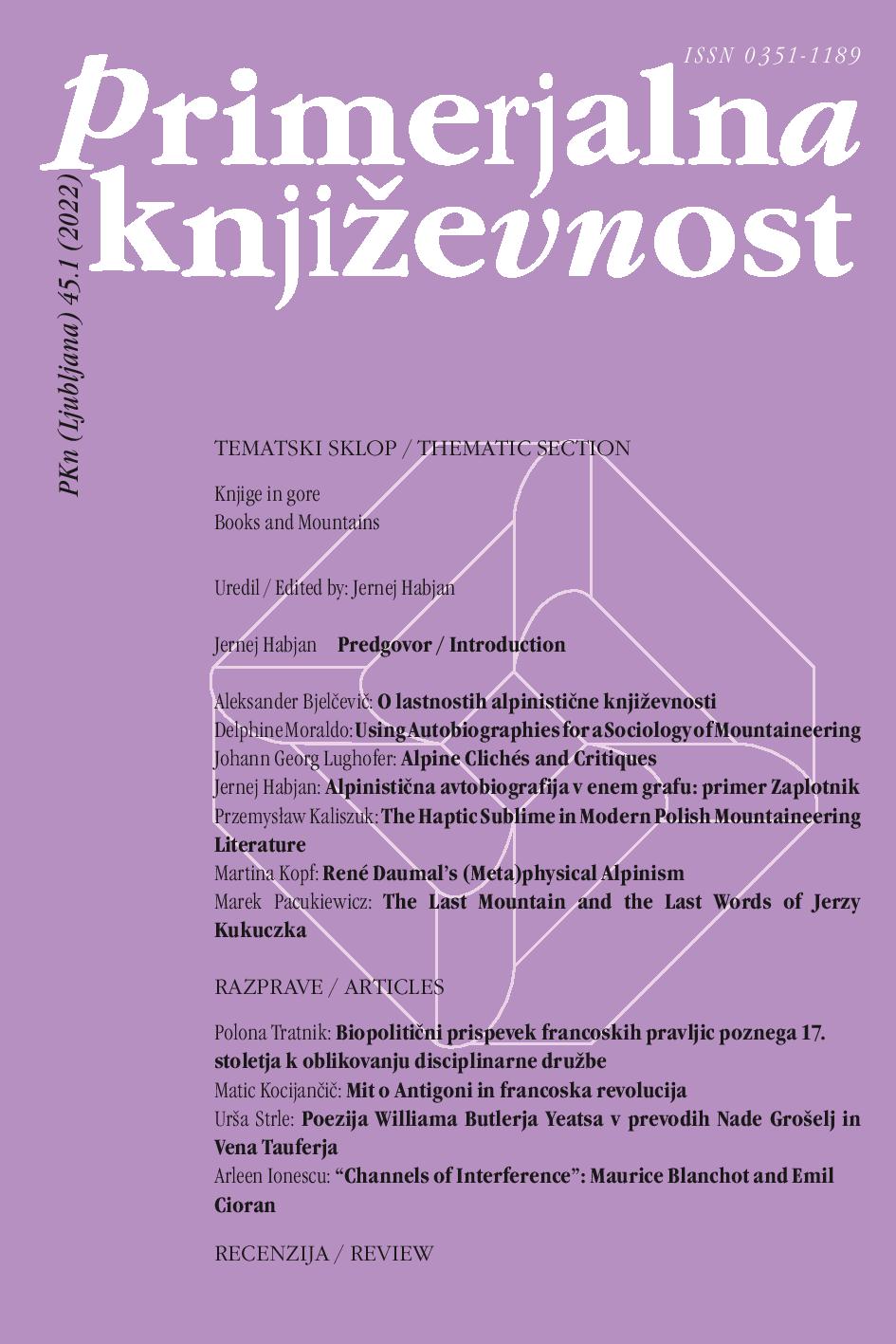Biopolitični prispevek francoskih pravljic poznega 17. stoletja k oblikovanju disciplinarne družbe
DOI:
https://doi.org/10.3986/pkn.v45.i1.08Ključne besede:
francoska književnost, 17. stoletje, pravljice, dvorska družba, aristokracija, proces civiliziranja, Perrault, Charles, Aulnoy, Marie-Catherine, Pepelka, ženske, spolne vloge, biopolitikaPovzetek
V članku obravnavam oblikovanje disciplinarne družbe, kot se kaže v aristokratski kulturi francoskih pravljičarjev in pravljičark konec sedemnajstega stoletja. Pravljice tedaj igrajo pomembno vlogo v procesu, ki ga je Norbert Elias imenoval proces civiliziranja. V primeru pravljic je to pomenilo oblikovanje vljudne dvorske družbe in v veliki meri discipliniranje žensk. Raziščem biopolitične vidike pravljic v tistih okoliščinah, saj se ravno tedaj skozi pravljice kažejo družbeni premiki in konsolidacija določenih konceptov; zlasti se vzpostavljata določen koncept feminilnosti in družbena vloga ženske, ki ostajata v veliki meri nespremenjena tudi kasneje. Preučujem pravljico o Pepelki, kot sta jo zapisala Charles Perrault in Marie-Catherine d’Aulnoy. Na primerih obravnavam reprezentacijo spola, spolnih vlog in odnosov, kot tudi sporočilnost in moralni poduk. Sredi dvajsetega stoletja je Walt Disney priredil Perraultovo Pepelko, s čimer je ta inačica postala svetovno najbolj znana pravljica o Pepelki. Biopolitični pomen Perraultove Pepelke oziroma Disneyeve priredbe Pepelke kot verjetno najbolj globalizirane zgodbe nasploh je bil in je še vedno izjemen.
Literatura
Beasley, Faith Evelyn. »Changing the Conversation: Re-positioning the French Seventeenth-Century Salon«. <em>L'Esprit Créateur</em> 60.1 (2020): 34–46.
Beasley, Faith Evelyn. <em>Revising Memory: Women’s Fiction and Memoirs in Seventeenth-Century France</em>. New Brunswick, NJ: Rutgers University Press, 1990.
Beasley, Faith Evelyn, ur. <em>Teaching Seventeenth- and Eighteenth-Century French Women Writers</em>. New York, NY: MLA, 2011.
Betts, Christopher. »Explanatory Notes«. <em>The Complete Fairy Tales</em>. Avtor Charles Perrault. Oxford: Oxford University Press, 2009. 196–204.
Betts, Christopher. »Introduction«. <em>The Complete Fairy Tales</em>. Avtor Charles Perrault. Oxford: Oxford University Press, 2009. ix–xxxvii.
Bottigheimer, Ruth. »Fertility Control and the Birth of the Modern European Fairy-Tale Heroine«. <em>Marvels & Tales</em> 14.1 (2000): 64–79.
Burcar, Lilijana. »Pozabljene literarne pravljice francoskih salonskih pisateljic«. <em>Slavistična revija</em> 68.2 (2020): 197–210.
Lougee, Carolyn C. <em>Le Paradis des Femmes: Women, Salons, and Social Stratificaiton in Seventeenth-Century France</em>. Princeton, NJ: Princeton University Press, 1976.
D’Aulnoy, Marie-Catherine. »Drobtinica Pepelka«. <em>Pavji kralj in druge pravljice</em>. Ljubljana: Mladinska knjiga, 1987. 121–142.
D’Aulnoy, Marie-Catherine. »Finette Cendron«. <em>The Great Fairy Tale Tradition: From Straparola and Basile to Brothers Grimm</em>. Ur. Jack Zipes. New York, NY; London: W. W. Norton & Company, 2001. 454–467.
DeJean, Joan. <em>Tender Geographies: Women and the Origins of the Novel in France</em>. New York, NY: Columbia University Press, 1991.
de Rougemont, Denis. <em>Ljubezen in Zahod</em>. Ljubljana: Založba *cf., 1999.
Elias, Norbert. <em>The Court Society</em>. Oxford: Basil Blackwell, 1983.
Elias, Norbert. <em>O procesu civiliziranja. Prvi zvezek</em>. Ljubljana: Založba *cf., 2000.
Farrell, Michele. »Celebration and Repression of Feminine Desire in Mme d’Aulnoy’s Fairy Tale: <em>La Chatte Blanche</em>«. <em>L’Esprit Créateur</em> 29.3 (1989): 52–64.
Foucault, Michel. <em>»Družbo je treba braniti«. Predavanja na Collège de France (1975–1976)</em>. Ljubljana: Studia Humanitatis, 2015.
Hannon, Patricia. »Antithesis and Ideology in Perrault’s ‘Riquet à la houppe’«. <em>Cahiers du Dix-Septième: An Interdisciplinary Journal</em> 4.2 (1990): 105–117.
Hannon, Patricia. »<em>Corps cadavres</em>: Heroes and Heroines in the Tales of Perrault«. <em>The Great Fairy Tale Tradition: From Straparola and Basile to Brothers Grimm</em>. Ur. Jack Zipes. New York, NY; London: W. W. Norton & Company, 2001. 933–957.
Hannon, Patricia. <em>Fabulous Identities: Women’s Fairy Tales in Seventeenth-Century France</em>. Amsterdam; Atlanta, GA: Rodopi, 1994.
Hannon, Patricia, in Anne E. Duggan. »French Tales«. <em>The Greenwood Encyclopedia of Folktales and Fairy Tales</em>. Ur. Donald Hasse. Westport, CT; London: Greenwood Press, 2008. 379–388.
Harth, Erica. <em>Cartesian Women: Versions and Subversions of Rational Discourse in the Old Regime</em>. Ithaca, NY; London: Cornell University Press, 1992.
zum Kolk, Caroline, in Wilson-Chevalier, ur. <em>Femmes à la cour de France: Charges et fonctions (XVe–XIXe siècle)</em>. Lille: Presses Universitaires du Septentrion, 2018.
Lancelyn Green, Roger. »The Girl with the Rose-Red Slippers«. <em>Tales of Ancient Egypt</em>. New York, NY: Puffin Books, 1970. 180–184.
Luthi, Max. <em>The European Folktale: Form and Nature</em>. Bloomington, IN: Indiana University Press, 1984.
Perrault, Charles. »Cinderella: or, The Glass Slipper«. <em>The Complete Fairy Tales</em>. Avtor Charles Perrault. Oxford: Oxford University Press, 2009. 130–141.
Perrault, Charles. »Preface«. <em>The Complete Fairy Tales</em>. Avtor Charles Perrault. Oxford: Oxford University Press, 2009. 3–7.
Roalfe Cox, Marian. <em>Cinderella: Three Hundred and Forty-Five Variants</em>. London: Folklore Society, David Nutt, 1893.
Seifert, Lewis C. <em>Fairy Tales, Sexuality, and Gender in France, 1690–1715: Nostalgic Utopias</em>. Cambridge; New York, NY: Cambridge University Press, 1996.
Seifert, Lewis C. »On Fairy Tales, Subversion, and Ambiguity: Feminist Approaches to Seventeenth-Century Contes de fées«. <em>Marvels & Tales</em> 14.1 (2000): 80–98.
Reiss, Timothy J. <em>The Meaning of Literature</em>. Ithaca, NY: Cornell University Press, 1992.
Tatar, Maria. <em>The Annotated Classic Fairy Tales</em>. New York, NY; London: W. W. Norton & Company, 2002.
Tratnik, Polona. »Pravljica: družbena resničnost in mirabilis – s posebnim ozirom na renesančne različice pravljice o Pepelki«. <em>Studia Historica Slovenica: časopis za humanistične in družboslovne študije</em> 20.2 (2020): 957–984.
Zipes, Jack. <em>The Trials and Tribulations of Little Red Riding Hood: Versions of the Tale in Sociocultural Context</em>. New York, NY; Oxon: Routledge, 1993.
Zipes, Jack. »Cross-Cultural Connections and the Contamination of the Classical Fairy Tale«. <em>The Great Fairy Tale Tradition: From Straparola and Basile to Brothers Grimm</em>. Ur. Jack Zipes. New York, NY; London: W. W. Norton & Company, 2001. 845–869.
Zipes, Jack. »Introduction«. <em>The Great Fairy Tale Tradition: From Straparola and Basile to Brothers Grimm</em>. Ur. Jack Zipes. New York, NY; London: W. W. Norton & Company, 2001. xi–xiv.
Zipes, Jack. <em>When Dreams Come True: Classical Fairy Tales and Their Tradition</em>. New York, NY; London: Routledge, 2007.
Zipes, Jack. <em>Fairy Tales and the Art of Subversion</em>. New York, NY; Oxon: Routledge, 2012.


